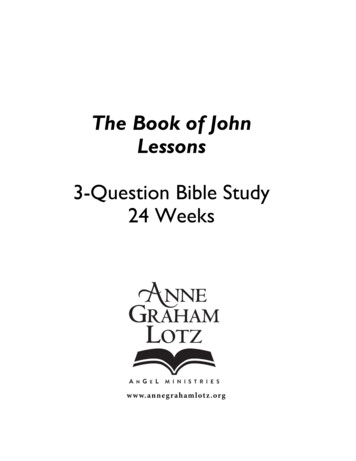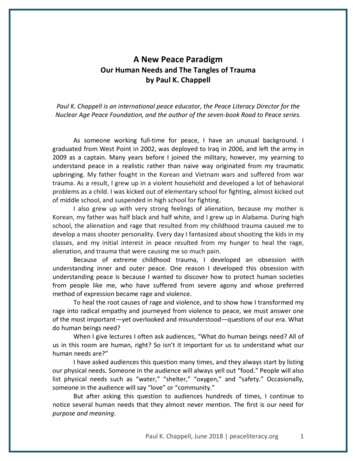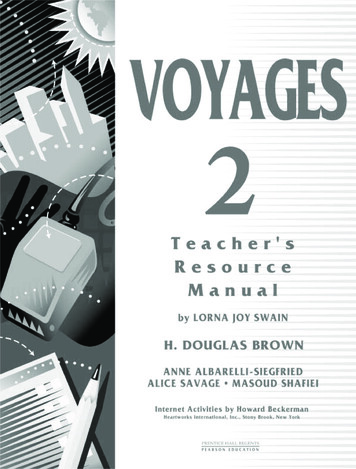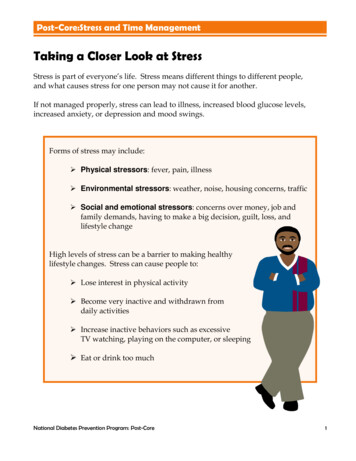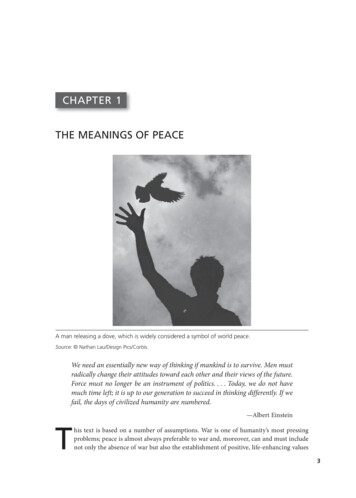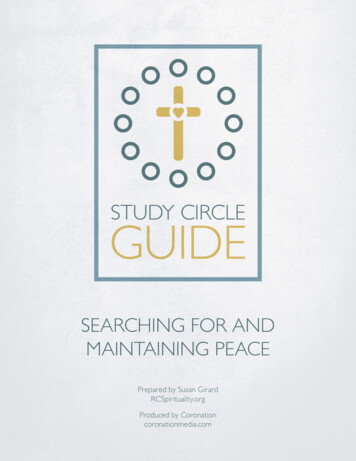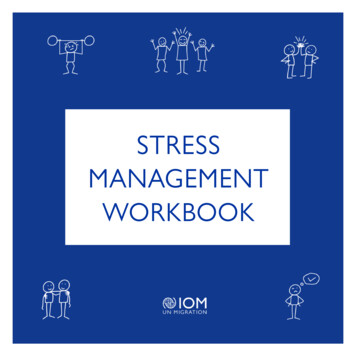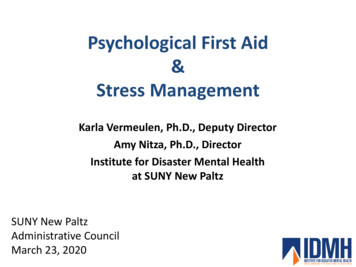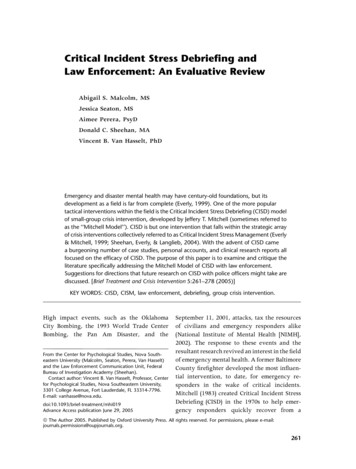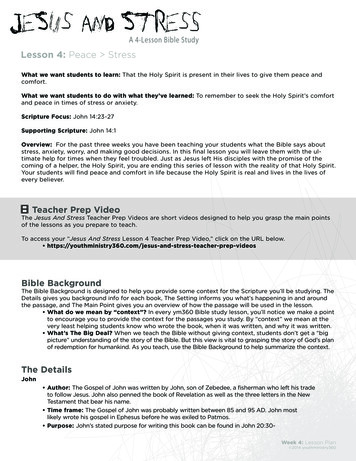
Transcription
Lesson 4: Peace StressWhat we want students to learn: That the Holy Spirit is present in their lives to give them peace andcomfort.What we want students to do with what they’ve learned: To remember to seek the Holy Spirit’s comfortand peace in times of stress or anxiety.Scripture Focus: John 14:23-27Supporting Scripture: John 14:1Overview: For the past three weeks you have been teaching your students what the Bible says aboutstress, anxiety, worry, and making good decisions. In this final lesson you will leave them with the ultimate help for times when they feel troubled. Just as Jesus left His disciples with the promise of thecoming of a helper, the Holy Spirit, you are ending this series of lesson with the reality of that Holy Spirit.Your students will find peace and comfort in life because the Holy Spirit is real and lives in the lives ofevery believer.Teacher Prep VideoThe Jesus And Stress Teacher Prep Videos are short videos designed to help you grasp the main pointsof the lessons as you prepare to teach.To access your “Jesus And Stress Lesson 4 Teacher Prep Video,” click on the URL below. her-prep-videosBible BackgroundThe Bible Background is designed to help you provide some context for the Scripture you’ll be studying. TheDetails gives you background info for each book, The Setting informs you what’s happening in and aroundthe passage, and The Main Point gives you an overview of how the passage will be used in the lesson. What do we mean by “context”? In every ym360 Bible study lesson, you’ll notice we make a pointto encourage you to provide the context for the passages you study. By “context” we mean at thevery least helping students know who wrote the book, when it was written, and why it was written. What’s The Big Deal? When we teach the Bible without giving context, students don’t get a “bigpicture” understanding of the story of the Bible. But this view is vital to grasping the story of God’s planof redemption for humankind. As you teach, use the Bible Background to help summarize the context.The DetailsJohn Author: The Gospel of John was written by John, son of Zebedee, a fisherman who left his tradeto follow Jesus. John also penned the book of Revelation as well as the three letters in the NewTestament that bear his name. Time frame: The Gospel of John was probably written between 85 and 95 AD. John mostlikely wrote his gospel in Ephesus before he was exiled to Patmos. Purpose: John’s stated purpose for writing this book can be found in John 20:30Week 4: Lesson Plan 2014 youthministry360
31, the last two verses in his gospel: “Now Jesus did many other signs in the presence of the disciples,which are not written in this book; but these are written so that you may believe that Jesus is the Christ,the Son of God, and that by believing you may have life in his name.” John’s goal seems to have been toclearly communicate a full theology of Jesus as the Messiah, the promised Son of God.The SettingJohn 14 comes in the midst of what the ESV Study Bible calls, “the farewell discourse.” This is a great termdescribing exactly what Jesus is doing in chapters 13-20. Jesus is at the end of His earthly ministry and ispreparing His disciples to carry the message of salvation throughout the entire world. As He prepares to goto the cross and eventually leave the earth He wanted His disciples to know that just as He gave them comfort in life the Holy Spirit would be coming to bring that same peace and comfort.The Main PointPeace and comfort are the prescriptions for a stress filled life. People today spend lots of money on exoticvacations, trips to the spa, and any number of things for the home to help them relax. All these things aregood and they all can help out with stress. But God provided His children with the ultimate stress buster.God sent His son Jesus to the earth to minister to people and to take away our sin at the cross. Jesus was agreat comfort to people, but He could only be in so many places at any given time. When God sent the HolySpirit on the day of Pentecost, He provided a 24/7 source of comfort and peace for every believer. You willhelp remind your students of this wonderful gift that’s inside of them and ready to help at any time.Lesson PlanThe Lesson Plan contains three elements: An introductory activity called The Lead In; the Bible study sectioncalled The Main Event; an application-focused segment called The Last Word.The Lead In Goal: To help students identify some of the things in their lives that bring comfort and peace. Set-Up: None needed.FIRST, ask your students if any of them have ever been to one of those stores in a mall that has all thosefoot and back massaging tools. Ask if they have ever tried one out or maybe sat in a massaging chair.Tell them that in this stressed out world people are always looking for things that bring them relief fromphysical and mental stress. Explain that you are going to let them identify some things in their lives thatbring them comfort.THEN, lead students in a discussion where they list some of their “comfort things” in life. Ask questions similar to the following: What are some of your favorite comfort foods? If you want to be comfortable what are some of the clothes you like to wear? Do you have a favorite pillow? Where did you get it, how long have you had it, and why is it yourfavorite? What things do you have at your house that you turn to when you are stressed out? What kind of music helps out when you are stressed? Do you have a pet that helps get your mind off your stress? Do you have a place like a vacation spot or a camp your church goes to that really helps you feelat peace?Week 4: Lesson Plan 2014 youthministry360
Take a few minutes to let the students talk about some of their answers as you read each question. Hopefullythis is a fun and interesting discussion. Once you have gone through all the questions ask them the question: What is the one thing all your “comfort things” have in common?You may get a lot of different responses. But what you want to help your students discover is that as greatas some of the things on their lists are, none of them offer lasting peace. All of them, even that pillow they’vehad for years, can be taken away.FINALLY, explain that in this last lesson on Jesus and Stress they will find out that the Holy Spirit is the constant answer to their stress in life and will bring peace and comfort that is real and lasting.Transition to the Main Event by saying something like the following: God created us and knows everything about us so He knows we are prone to experience stress,worry, and anxiety. Today you are going to be reminded of how the Holy Spirit helps us in ourtimes of stress and wants to bring us peace and comfort. By the end of the lesson you will beable to be confident in the fact that the Holy Spirit lives in you and is there to guide and comfortyou each and every day.The Main Event Goal: To help your students understand that the Holy Spirit is present in their lives to give thempeace and comfort. Set Up: None needed.FIRST, begin the Bible study portion of the lesson by doing a quick review of the previous lessons. Ask ifstudents can remember anything that stands out to them from the last few weeks. If you need to, use thefollowing bullet points to review: Lesson 1: We can trust God with the stress of life instead of running after worry and anxiety. Lesson 2: Choosing to focus on Christ is a way to not only deal with stress but make better choices in life. Lesson 3: Choosing to trust God with stress is the right decision even if they don’t understandexactly what God is doing. Lesson 3: We should surrender to God’s direction in life because He always knows what is bestfor us.THEN, begin the Bible study by having students turn to John 14. Use the Bible Background to provide context for the passage. When students have found the chapter, read or have a student read John 14:23-24.When they’ve finished lead them in a short discussion. Ask something like: What connection does Jesus say exists between loving Jesus and obeying Him?o Answer: If we love Him, we obey Him. If we don’t love Him, we won’t obey Him. Does this mean that because we sin we don’t love God? Why or why not?o Answer: We all sin. It’s part of our sin nature. Jesus is most likely referring to a pattern orlifestyle of sin. Someone who doesn’t work to fight temptation and simply gives in to the sinin their lives probably doesn’t believe in and follow Jesus. What is the result of loving and obeying Jesus?o Answer: The Bible says God loved us before we loved Him. When we reciprocate this lovethrough saving faith, we know that the Holy Spirit comes to dwell in us. We are eternallybound to God by the Spirit. In a sense, God makes His home with us.NEXT read or have a student read John 14:25-26 and remind your students that this passage takes place atthe end of Jesus’ three-year ministry on the earth. As He prepares to go to Calvary He is desperately tryingto make sure His final words are important words. Explain to students that once Jesus established the imWeek 4: Lesson Plan 2014 youthministry360
portance of living the life He lived, He went on to again say He wouldn’t be around much longer but God willsend something to help them day-by-day. Ask: Who knows what Jesus said God would send to help them out?o Answer: God would send the Holy Spirit which different versions of the Bible also call theAdvocate, the Comforter, the Helper, and the Counselor. If you want to ask the students which word is their favorite use this guide to help you in yourdiscussion. ADVOCATE: One who pleads and defends the cause of another or speaks for another. COMFORTER: One who brings peace through the knowledge of God and the presence of God. HELPER: One who assists others through guidance and understanding. COUNSELOR: One who gives advice or in this case confirms the teachings of Jesus asbeing from God.THEN, ask what Jesus said the Holy Spirit would do for the disciples. Point out that the disciples actuallyheard Jesus speak the words we have in our Bibles. After Jesus ascended to Heaven the Holy Spirit wouldhelp the disciples recall His teachings. Explain to them that the Holy Spirit today still helps to remind us whatis in the Bible thus confirming the reality of Jesus and God and the power of the scriptures.NEXT, read or have a student read John 14:27. Facilitate a discussion among your students by asking thefollowing questions: Does anyone know what is the common thing for Jewish people to say to each other when theyare about to leave?o Answer: Shalom Does anyone know what the word means?o Shalom means farewell, may you prosper, may you have good health, may you be at peace, etc. Does it same strange to leave with an offering of peace when the world in Jesus’ day was prettycalm to start with?o Answer: Actually the world during the time of Christ was filled with fear over Roman oppression, worry over keeping the law, anger, and frustration. Living in this world has alwaysbeen stressful. Why did Jesus say the peace He offered was different from what the world had to give?o Answer: When people said shalom it was usually just an empty word without much meaning but from the mouth of Jesus the word peace had power. Jesus’ words had the power toconquer fear and the ability to calm troubled hearts. What could be the deeper meaning behind the phrase “Don’t let your hearts be troubled orafraid?”o Answer: The peace and calm that Jesus brought to the people around Him was obvious. Jesus may have been looking to His death on the cross as the way to bring permanent peacewith God to our hearts. Some scholars even suggest there is a hint of the glory and peace ofheaven in this verse.NEXT, back up a bit to the first of John chapter fourteen and read or have a student read John 14:1. It is important to set up this verse by telling your students that Jesus knew the disciple’s faith might be shaken byHis crucifixion and that they would continue to suffer persecution. Also point out that Jesus knew the responsibility for spreading the Gospel throughout the world would be in the hands of these twelve men. Withthat in mind ask how important it was for Jesus to tell them to not let their hearts be troubled. You may wantto use this interpretation of the verse by an unknown theologian: Don’t allow yourself to be intimidated by the situation.Tell the students this speaks right to where they are today. To make a stand for Christ is to sometimes be inintimidating situations. People love to poke fun at Christians and downplay the importance of Christ. Remind them Christians are still being persecuted around the world today. Then add the end of the verse to thestatement above:Week 4: Lesson Plan 2014 youthministry360
Don’t allow yourself to be intimidated by the situation. If you believe or trust in the power of Godthen you can believe or trust in Me.FINALLY, transition into the Last Word by saying something similar to the following: What an incredible way to finish a series of lessons on Jesus and stress. Jesus promised that theHoly Spirit would come and He did not wait long after Jesus ascended into Heaven. You don’thave to beg God for the gift of the Holy Spirit because it comes in your life when you place yourfaith in God through Jesus. The Holy Spirit is readily available to guide you and comfort youthrough all of life’s situations, many of which will be stressful. And don’t be intimidated by thesituations you face in life. The power of God is greater than your stress and that power lives inyou today through the Holy Spirit.Make sure no one has any questions then move to wrap up the lesson with the Last Word.The Last Word Goal: To help students have the opportunity to experience the peace and comfort of the Holy Spirit. Set-Up: None needed.FIRST, tell the students that they have read and heard a lot about the comfort and peace of the HolySpirit today and now you want to give them an opportunity to experience that comfort and peace. Beginby asking everyone to get comfortable and as best they can shut off their thoughts about what is goingon in their world and just focus on Christ. If available you may want to display a picture that symbolizesthe Holy Spirit in a place where everyone can see it. Tell them to listen as you read some great versesfrom the Bible about the work of the Holy Spirit.THEN, read some or all of the following verses: Therefore go and make disciples of all nations, baptizing them in the name of the Father andof the Son and of the Holy Spirit, and teaching them to obey everything I have commandedyou. And surely I am with you always, to the very end of the age. – Matthew 28:19-20 But you will receive power when the Holy Spirit comes on you; and you will be my witnessesin Jerusalem, and in all Judea and Samaria, and to the ends of the earth. – Acts 1:8 Peter replied, “Repent and be baptized, every one of you, in the name of Jesus Christ for theforgiveness of your sins. And you will receive the gift of the Holy Spirit.” – Acts 2:38 And hope does not disappoint us, because God has poured out his love into our hearts by theHoly Spirit, whom he has given us. – Romans 5:5 May the God of hope fill you with all joy and peace as you trust in him, so that you may overflow with hope by the power of the Holy Spirit. – Romans 15:13 Guard the good deposit that was entrusted to you--guard it with the help of the Holy Spiritwho lives in us. – 2 Timothy 1;14 But when the Holy Spirit controls our lives, he will produce this kind of fruit in us: love, joy,peace, patience, kindness, goodness, faithfulness, gentleness, and self-control. – Galatians5:22-23 Always keep yourselves united in the Holy Spirit, and bind yourselves together with peace.– Ephesians 4:3 Don’t worry about anything; instead, pray about everything. Tell God what you need, andthank him for all he has done. If you do this, you will experience God’s peace, which is farmore wonderful than the human mind can understand. His peace will guard your hearts andminds as you live in Christ Jesus. – Philippians 4:6-7Week 4: Lesson Plan 2014 youthministry360
NEXT ask the students to think about the most stressful thing that is happening in their lives today. Tellthem it could be a test at school or something as complicated as a family situation. It could even be adecision they are wrestling with right now. After they have thought of a response, remind them of somethings they have learned over the past four weeks to help them with stress. Ask them to consider anythat apply to their situation. Remember God is bigger than your stress. Do what you can and leave the rest up to God. Stay focused on Christ. Surrender to God’s direction in your life. Ask the Holy Spirit to comfort during this time in your life.FINALLY, close by reminding your students that the world today is very stressful but life had alwaysbeen stressful. Tell them that God’s word has many wonderful scriptures on help for anxiety and worryand challenge them to continue to look to the Bible for answers to their problems. Tell the students thatas you close in prayer you want them to think about the stressful thing they thought about a few moments ago. If any feel led have them share those concerns with the group. Pray for the Holy Spirit tobring peace and calm in the lives of your students. After the prayer tell them you are always available totalk about any stresses they may have in life. Don’t forget to distribute the devotions to your students this week. If you’re printing them, havethem available for students as you wrap up class. If you’re texting a link, posting them on Facebook, or some other means of electronic distribution, make sure you inform students of whenthey will be receiving them. Use the Social Media guide to stay in touch with students via text or Twitter, and to encouragethem to follow through with reading their devotions and with being mindful of the choices theymake during the week.We Want To Hear From You . . . Do you have questions about a lesson? Something that worked particularly well you want to share? Something that didn’t work you want to bring up?We value your feedback! Please do not hesitate to email us with your questions, comments,or concerns, at feedback@youthministry360.com.Week 4: Lesson Plan 2014 youthministry360
clearly communicate a full theology of Jesus as the Messiah, the promised Son of God. The Setting John 14 comes in the midst of what the ESV Study Bible calls, “the farewell discourse.” This is a great term describing exactly what Jesus is doing in chapters 13-20. Je
